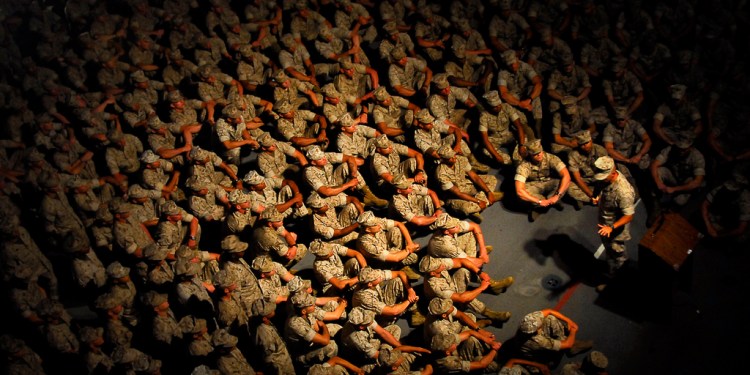
Simon Sinek leads off his TED Talk, and his new book, with a moving story about a US military commander who loves his troops. It’s among several TED Talks featuring lessons in leadership from the military. But when civilians are asked to draw such lessons from military leaders, let’s agree: It’s complicated.
A few thing we don’t have in common: Each person who joins the military is trained over many months, and part of that training involves learning their place within an explicit chain of command. Each person (at least in theory) is placed into a role where they can succeed, based in part on aptitude tests, and receives training for that role. People join the military for a set amount of time, barring a stop-loss policy. There’s a path to advancement and rank that everyone understands. And there’s a long tradition of an officer class trained to lead.
None of these conditions, really, apply to most civilian organizations whose leaders and workers are hungry for management tips. In other words, there’s no ancient tradition of teaching people how to lead a team of web producers (or social workers, or factory workers). It’s smart to tap the industries that do have this tradition, but it’s also important not to apply their wisdom slapdash, to treat the military as a lab for testing management theories. (Being clear, I don’t think that’s what Sinek is doing.)
Another thing we don’t have in common: A civilian leader can’t fairly promise never to fire a worker, never to place them in a job that’s not a fit for their skills and interests, never to re-org and create layoffs. And it’s kind of haunting to suggest that when a manager does one of those things, it’s out of a lack of love.
Last week I wrote about the submarine commander who used specific language tweaks to rework his chain of command. It’s an amazing stunt, and worth thinking about — but it’s not immediately applicable to someone who’s not managing exquisitely trained sailors, calling on a shared understanding of a chain of command. To compare, the crew who put this website and blog together are, um, not controllable to the degree where I could tell them the exact words to use to communicate with me or one another. Which means that every so often we misunderstand one another. And that’s when our very civilian lack of tradition, system and formal rank is important to remember — because it means that a failure of communication or process probably isn’t due to a deep flaw in a formal system, but is just two people with different ideas, a problem solved by talking, sometimes at length. It’s not acceptable in a battlespace, but in the perpetual pickup-basketball game that is modern work, it’s what we do.
[ted id=1998]
Image: Gunnery Sgt. Scott Dunn via The United States Marine Corps/Flickr.











